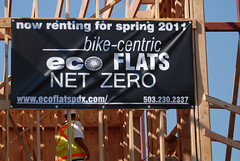Other than her unfortunate position on bike share (which she ultimately supported), Portland City Commissioner Amanda Fritz isn’t known for her record on transportation policy. Even so, there have been stirrings this week — thanks to results of a survey of city hall staffers released by The Portland Mercury yesterday — about her being named the commissioner in charge of the Bureau of Transportation (PBOT).
We’ll address that issue in another post. For now, ever wondered how Commissioner Fritz feels about the heated topic of apartment buildings being built without car parking (a.k.a. “low-car apartments”)?
Yesterday, Fritz responded to a constituent email written by north Portland resident Jessica Roberts (who happens to be a former advocate at the Bicycle Transportation Alliance and now works at Alta Planning + Design). Jessica writes great citizen feedback letters. We’ve profiled her in the past and she’s even written an article for us about how to get your letter published in the newspaper.
Back in November, Jessica emailed Barry Manning with the City’s Bureau of Planning and Sustainability about the apartment parking issue and cc’d Commisioner Fritz (and others). Below are Jessica’s original email followed by Fritz’s response (emphases are mine).
Dear Mr. Manning,
I am unable to make today’s hearing on no-parking development, so I am requesting that you accept this comment by email.
I strongly support the elimination of parking minima for development on major transit lines, and feel it would be a major step backwards for our city if we reversed this policy to require on-site vehicle storage.
My husband and I do not own a car. When we bought a home, we wanted to be as close in as possible precisely so that we can bike, walk, and take transit – thus not buying a car, and thus keeping our negative impact on the environment and our neighborhoods minimal. However, far too many condo developments bundled on-site parking that we did not need and did not want – and that raised the price of the unit beyond what we could consider. It wasn’t until we found one of the earliest developments to take advantage of the TOD no-parking policy that we could actually afford a home. It would have materially raised the cost of housing for us if we only had housing available to us with vehicle storage.
The public right-of-way is not guaranteed or exclusive vehicle storage for any individual Portland resident. If neighbors who object to the new development have homes built before parking minima were eliminated, they ought to have vehicle parking, in which case there is no problem. If they do not have on-site vehicle storage, then they have no greater right to ‘reserve’ the public right-of-way [emphasis mine] for their own private use than newer residents. In no case, however, is it good public policy to require parking minima for the convenience of homeowners who happen to already live in a neighborhood (and who probably bought homes back when housing and rental prices did not exclude low-income residents from far too many neighborhoods).
The free market has the ability to regulate on-street parking demand. If our streets truly become so clogged with cars that buyers demand on-site parking, I am confident that developers will provide on-site parking.
In the meantime, however, it is a matter of equity to allow low- and no-car households in our city decent housing options that do not force them to pay for a resource (vehicle parking) they cannot afford and do not want.
Yours,
Jessica
And here’s how Commissioner Fritz responded (party edited for brevity):
Dear Jessica,
…
While I share your concern for the public right-of-way remaining public and available to all, I ask you also to consider the needs of people with disabilities, people who work evening and night shifts, and families with day care providers not located on the same transit lines. All of those groups may need on-site parking. I don’t believe any large multi-family building in a desirable neighborhood should be reserved only for those who have the physical, job, and family characteristics that allow car-free living or walking several blocks to get to their car. Providing four parking spaces in a 20-unit building isn’t contrary to our ideals – it would recognize that there are many different folks in Portland, and one size seldom fits all.
…
Sincerely,
Amanda
Amanda Fritz
Commissioner, City of Portland
I share this not only so you have a sense of where Fritz stands, but to remind you to keep the issue in mind. The City Council is set to have a work session on it today at 2:00 pm. So far, no changes in policy have been put on the table; but as you can see with Commissioner Fritz, there is a sense among some leaders that the current policy isn’t working.
For more on Portland’s parking debate, read the recent guest column in The Oregonian written by parking expert Donald Shoup.


